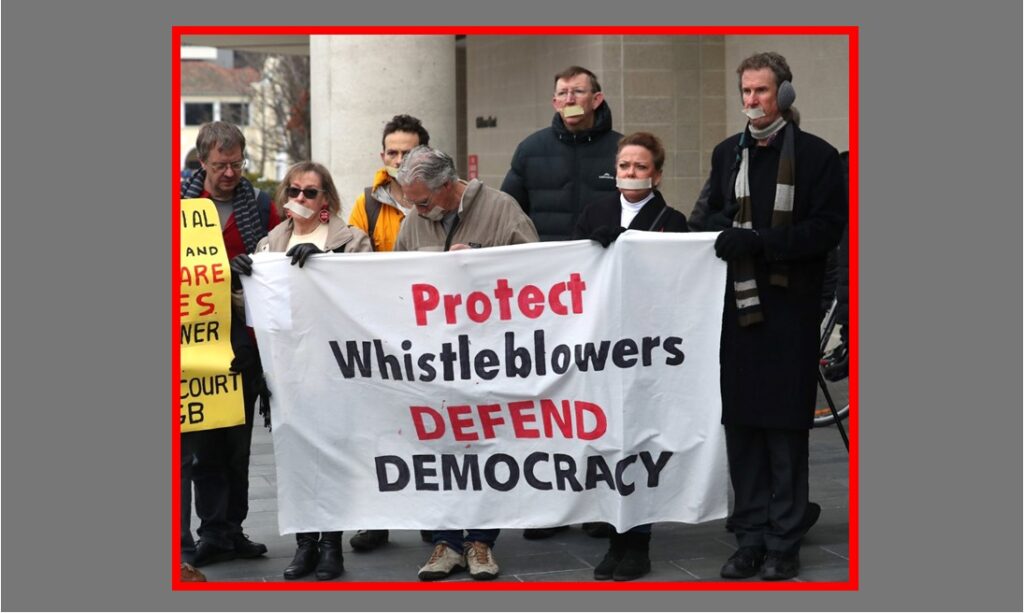This Watching Brief was prepared by the Quaker Peace and Legislative Committee. To download a copy of the Brief click HERE.
March 2024
There is increasing concern that promised moves to strengthen protection for whistleblowers have still to eventuate, despite continuing examples of ‘persecution’ of those who speak out. This Watching Brief is an update of one issued in 2019. It outlines recent proposals for action, and comments by the Attorney-General on government responses and plans.
Background
Wikipedia defines a whistleblower as “a person who exposes any kind of information or activity that is deemed illegal, unethical or not correct within an organisation that is either private or public”. Impediments to protecting whistleblowers include defamation laws, secrecy and confidentiality provisions, national security and data retention regulations. The Public Interest Disclosure Act 2013 has proven inadequate to offer protection, as seen in the case of military officer David McBride who has been denied recourse to that law in his case of revealing information about illegal actions by Australian military forces in Afghanistan. Some changes have been made towards greater support for those speaking out (e.g. Corporations Act and Taxation Administration Act offer greater protection regarding reports of misconduct) but there is little encouragement overall to reveal concerns.
Current Developments
In The Monthly (February 2024) Attorney-General Mark Dreyfus MP wrote about “restoring trust in government integrity and accountability” in the wake of Robodebt and the Coalition’s ‘undermining’ of various bodies designed to maintain standards in public life (including the
Administrative Appeals Tribunal, Administrative Review Council, Information Commissioner, and Independent National Security Legislation Monitor. He identified several changes under the new government –
- establishing the National Anti-Corruption Commission (NACC) to handle complaints of corrupt behavior in public office;
- abolishing the AAT and replacing it by an Administrative Review Tribunal to review government decisions;
- restoring human oversight of Services Australia to ensure effective services;
- strengthening the Commonwealth Ombudsman’s powers and requiring government officials to respond to its findings;
- reviewing secrecy laws (including under national security) and setting up safeguards to protect journalists from prosecution for public interest journalism.
In a detailed article in The Conversation (13 February 2024), Professor A.J. Brown and Research
Fellow Jane Olsen (Griffith University) report on draft design principles for a Whistleblower Protection Authority. Their research has been done in conjunction with Transparency International Australia and the Human Rights Law Centre. Their major findings are:
- Out of 15 key official functions required to make whistleblowing laws work, only four are currently effective, leaving serious gaps.. The main gaps are in relation to having independent powers to investigate claims of detriment or vengeful harm to whistleblowers.
- Only about half those revealing wrongdoing receive any remedies for adverse repercussions.
- A separate agency is needed to support whistleblowers in compensation claims, provide legal assistance and mediate with agencies to secure remedies. Such bodies overseas have had great success, especially in the private sector.
- A consistent seamless approach will ensure that whistleblowers do not fall through the cracks or face extra costs and barriers.
- Whistleblower protection is a standalone job, and requires adequate resources The new independent authority will have to partner with other agencies, conciliate and investigate.
- Any federal agency wishing to take legal action against a whistleblower should be required to prove to the authority that the action is justified.
Kieran Pender of the Human Rights Law Centre supports the establishment of an independent body. In an article for Crikey (13 February), he says that most Australians in the workforce are covered by a whistleblower regime, but these are fragmented and there is no agency tasked with helping whistleblowers navigate the process. The result is that too many people remain silent, and democracy is the worse for it. He recalls that the first federal enquiry into whistleblower protections by a Senate committee in the 1990s recommended having an agency alongside the law. In 2017, another parliamentary enquiry endorsed the creation of a one-stop-shop whistleblower authority. Cathy McGowan MP, Helen Hanes MP and the Greens tried to have such a body included in the legislation for a national anti-corruption agency. The recent scandals in banking, aged care, social welfare, military abuses and financial consultancies underline the need. Kieran Pender says that Attorney-General Mark Dreyfus can demonstrate his avowed passion for building strong public institutions by establishing a new whistleblower protection authority.
Action
It is timely to let politicians know of the urgency of creating a stronger protection system for whistleblowers, along the lines proposed in this Brief. They can be reminded of the ongoing charges being pursued against David McBride, and Richard Doyle.
Further Information
For general information, see Whistleblowers Australia www.whistleblowers.org.au. For details of corporate law, see Australian Securities and Investment Commission www.asic.gov.au
For details of the Public Interest Disclosure Act 2013 CLICK HERE.
NATIONAL QUAKER PEACE & LEGISLATION COMMITTEE
PO Box 6063, O’CONNOR, ACT 2602
E: cqplc@quakersaustralia.org.au
W: www.quakersaustralia.info/qplc

